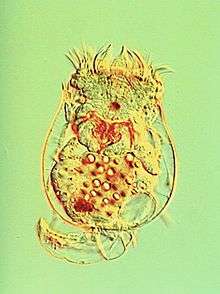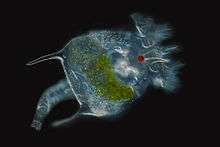Brachionus
| Brachionus | |
|---|---|
 | |
| Brachionus calyciflorus | |
| Scientific classification | |
| Kingdom: | Animalia |
| Phylum: | Rotifera |
| Class: | Monogononta |
| Order: | Plioma |
| Family: | Brachionidae |
| Genus: | Brachionus Pallas, 1766 |
| Species | |
|
about 30 [1] | |

Brachionus is a genus of planktonic rotifers occurring in freshwater, alkaline and brackish water.
Species
e.g.
- Brachionus asplanchnoidis,
- Brachionus calyciflorus,
- Brachionus plicatilis s.s.,
- Brachionus ibericus,
- Brachionus rotundiformis,
- Brachionus manjavacas,
- Brachionus sp. Austria,
- Brachionus sp. Almenara,
- Brachionus sp. Tiscar,
- Brachionus sp. Cayman,
- Brachionus sp. Nevada,
- Brachionus 'Persia',
- Brachionus 'Harvey' ,
- Brachionus 'Towerinniensis,
- Brachionus 'Coyrecupiensis',
- Brachionus 'Lost',
- Brachionus rubens,
- Brachionus falcatus,
- Brachionus havanaensis,
- Brachionus angularis,
- Brachionus diversicornis,
- Brachionus urceolaris,
- Brachionus forficula,
- Brachionus dimidiatus,
- Brachionus macracanthus,
- Brachionus caudatus,
- Brachionus quadridentatus,
- Brachionus dimidiatus,
- Brachionus patulus,
- Brachionus bidentata,
- Brachionus leydigi
- Brachionus koreanus
Use
Rotifers such as Brachionus calyciflorus are favored test animals in aquatic toxicology because of their sensitivity to most toxicants. They also are used as model organisms in various other biological fields e.g. due to their interesting reproductive mode in evolutionary ecology. Brachionus spp. are easily reared in large numbers and because of this are used to substitute for wild zooplankton for feeding hatchery reared larval fish. However, the composition of rotifers generally does not satisfy the nutritional requirements of fish larvae,[2] and large amounts of research have been invested in improving the lipid, vitamin and mineral composition of rotifers to better meet the requirements of fish larvae[3][4][5]
Reproduction
Brachionus species can normally reproduce asexually and sexually (cyclical parthenogenesis). Sexual reproduction (termed Mixis) is usually induced when population density increases. Mixis in Brachionus plicatilis has been shown to be induced by a density-dependent chemical cue.[6]
Transitions to obligate parthenogenesis have been described in Brachionus calyciflorus. In this species, obligate parthenogenesis can be inherited by a recessive allele, which leads to loss of sexual reproduction in homozygous offspring.[7][8]
Genome size
Haploid '1C' genome sizes in Brachionus species range at least from 0.056 to 0.416 pg.[9]
Genome sequencing
The complete mitochondrial genome of B. plicatilis sensu strictu NH1L has been sequenced.[10]
Cryptic species
Brachionus plicatilis has been demonstrated to be a large cryptic species complex consisting of several different species.[11] It has a worldwide diversity of at least 14 - 22 cryptic taxa. [12] [13]
Brachionus calyciflorus also seems to be a cryptic species complex. [14]
References
- ↑ "Brachionus Pallas, 1766". National Institute for Environmental Studies. Retrieved 2007-06-14.
- ↑ HAMRE, K.; SRIVASTAVA, A.; RØNNESTAD, I.; MANGOR-JENSEN, A.; STOSS, J. (2008). "Several micronutrients in the rotifer Brachionus sp. may not fulfil the nutritional requirements of marine fish larvae". Aquaculture Nutrition. 14 (1): 51–60. doi:10.1111/j.1365-2095.2007.00504.x.
- ↑ Penglase, S; Hamre, K.; Sweetman, J.; Nordgreen, A (2011). "A new method to increase and maintain the concentration of selenium in rotifers (Brachionus spp.)". Aquaculture. 315 (1-2): 144–153. doi:10.1016/j.aquaculture.2010.09.007.
- ↑ Dhert, Phillippe; Geert Rombautb; Gede Suantikaa; Patrick Sorgeloos (2001). "Advancement of rotifer culture and manipulation techniques in Europe". Aquaculture. 200 (1-2): 129–146. doi:10.1016/S0044-8486(01)00697-4.
- ↑ Nordgreen, A; Penglase, S.; Hamre, K. (2013). "Increasing the levels of the essential trace elements Se, Zn, Cu and Mn in rotifers (Brachionus plicatilis) used as live feed". Aquaculture. 380-383: 120–129. doi:10.1016/j.aquaculture.2012.11.032.
- ↑ Induction of sexual reproduction in Brachionus plicatilis (Monogononta, Rotifera) by a density-dependent chemical cue CP Stelzer, TW Snell - Limnology and Oceanography, 2003
- ↑ C.-P. Stelzer, J. Schmidt, A. Wiedlroither, and S. Riss (2010). Loss of Sexual Reproduction and Dwarfing in a Small Metazoan. PLoS ONE 5(9): e12854.
- ↑ Scheuerl, T., Riss, S., Stelzer, C.P. (2011). Phenotypic effects of an allele causing obligate parthenogenesis in a rotifer. Journal of Heredity 102(4): 409-415. http://jhered.oxfordjournals.org/cgi/reprint/esr036?ijkey=94jzFn7JvmYfQyM&keytype=ref
- ↑ Stelzer, C.P., Riss, S., Stadler, P. (2011) Genome size evolution at the speciation level: The cryptic species complex Brachionus plicatilis (Rotifera) BMC Evolutionary Biology 11: 90.
- ↑ Koushirou Suga, David B. Mark Welch, Yukari Tanaka, Yoshitaka Sakakura, and Atsushi Hagiwara (2008). Two Circular Chromosomes of Unequal Copy Number Make Up the Mitochondrial Genome of the Rotifer Brachionus plicatilis Mol Biol Evol (2008) 25(6): 1129-1137
- ↑ Gomez, A; et al. (2002). "Speciation in ancient species complexes: evidence from the molecular phylogeny of Brachionus plicatilis (Rotifera)". Evolution. 56 (7): 1431–1444. doi:10.1111/j.0014-3820.2002.tb01455.x. PMID 12206243.
- ↑ Extreme levels of hidden diversity in microscopic animals (Rotifera) revealed by DNA taxonomy D Fontaneto, M Kaya, EA Herniou… - Molecular Phylogenetics …, 2009 - Elsevier
- ↑ Diversity of the rotifer Brachionus plicatilis species complex (Rotifera: Monogononta) in Iran through integrative taxonomy Reza Malekzadeh-Viayeh1,*, Razieh Pak-Tarmani1, Nasim Rostamkhani2 and Diego Fontaneto3 Article first published online: 7 JAN 2014 DOI: 10.1111/zoj.12106
- ↑ Brachionus calyciflorus is a species complex: mating behavior and genetic differentiation among four geographically isolated strains JJ Gilbert, EJ Walsh - Rotifera X, 2005 - Springer
Huang, L. "Effectof Aldrin on Life History Characteristics of Rotifer Brachionus calyciflorus Pallas." Bull Environ Contam Toxicol no5 N 2007